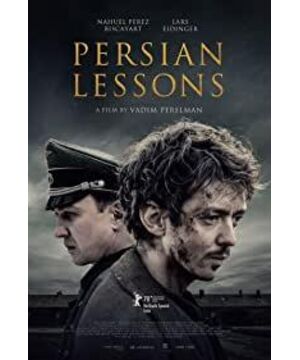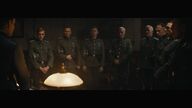First of all, let me express my personal attitude. I personally think that movies about the Holocaust should not be presented in a skit.
The reason why the presentation of the Holocaust in "Persian Lessons" is too sketchy is because the dramatic conflict of the whole film is based on the dramatic incident of the Jewish male protagonist teaching Nazi officers false Persian, and the whole story revolves around these two. Human relationships are structured. In this more than two-hour film, all the other prisoners in the concentration camp were just passed by, just as a name remembered by the male protagonist, and quickly showed one side in front of the camera. These people who were finally slaughtered not only became the symbolic tools for the male protagonist to make up the new Persian language, but also became the symbolic tools for the final sensational promotion in the movie. Before that, however, the audience was completely unable to empathize emotionally with any one person because they weren't even being told as a story character. The only characters that are characterised are a pair of Italian Jewish brothers, who are shown only to resolve a crisis event. A real Persian appeared. This Persian didn't even have a line. In order to save the male protagonist, the Italian brother cut the real Persian's throat. For this completely innocent Persian, it is difficult for the audience to completely bet on his brother emotionally, and then his brother was killed, so there is no emotional resonance (there is not much impact and resonance for the death of the Persian, the director deliberately refused to let him Its vocalization, once again de-characterized and symbolized). The Italian brother was also symbolically designed to be a mute, in order to complete the male protagonist's transformation from self-help to resistance. However, this transformation of the male protagonist is actually insufficient (although it is realistic, but it lacks the foreshadowing in terms of drama). Because the male protagonist's dramatic tension revolves around his relationship with the Nazi officer, the relationship between the two is too extreme in the dramatic situation to really develop (the officer can kill the male protagonist at any time), so twice The depth of their relationship can only be a short memory of the officer's personal emotions and personal past.
Interestingly, "Persian Language Lesson" does not put too much narrative perspective on other prisoners in the concentration camp, but puts a large part of the narrative weight on the daily life of the middle and lower-level officers in the concentration camp. This in itself is a good attempt for me to restore these officers as normal people. They also fall in love, care about what to eat for lunch, gossip about their bosses, and worry about getting out of shape. But at the same time, these normal people will press the palms of the Jews against the hot iron plate and shoot the Jews at will. But the film is just a daily demonstration of this banal evil, which makes many of the film's narrative seem unfinished. The young subordinate soldier who always wanted to kill the male protagonist finally found out that the male protagonist was taken away privately by a Nazi officer, and tried to report it to his superiors, but the result was nothing, and the film did not give any explanation to the young subordinate soldier at the end. Several other Nazi women who had a lot of ink, did not have any explanation in the end. What narrative purpose does the movie show their normal side to express?
The most regrettable part is that the relationship between the male protagonist and the Nazi officer ended abruptly. As mentioned earlier, because the male protagonist and the Nazi officer are in such an extreme dramatic situation in a concentration camp, it is difficult to deepen the relationship between the two. Then when the concentration camp was captured and the Nazi officer fled with the male protagonist, the relationship between the two changed from a prisoner-officer to two ordinary people. At this time, an in-depth dialogue could actually be conducted. Or to be more dramatic, after the liberation of Nazi officers who were detained as war criminals, the male protagonist testified as a witness, the two exchanged their identities, and had another exchange and dialogue, all of which could lead to a more in-depth discussion of the relationship between the two.
I have always believed that the dramatic tension of letting the male protagonist say the names of the slaughtered prisoners is far less shocking than letting the Nazi officers say them themselves. For this Nazi officer who represents the banal evil, the names of those who are nameless, those who die casually have nothing to do with him, the names of these people are exactly what he recites day and night and recognizes as beautiful and moving. "Persian".
In the movie, the last separate dialogue between the male protagonist and the Nazi officer was actually just the male protagonist asking: "Why do you save me?" The Nazi officer said: "I bet you 20 boxes of canned food, and I don't want to lose." In other words, the node of the relationship between the two was actually letting the Nazi officer serve as a savior throughout. So that in the end, the Nazi officer was arrested in Tehran, and a lot of the audience felt distressed for him, and even felt unhappy that he was betrayed by the male protagonist (infatuation and wrong payment).
Of course, if this is not a Holocaust-themed movie, this dramatic and even comedic relationship between the male protagonist and the Nazi officer is completely fine. However, this is a Holocaust-themed movie. The Nazi officer is an accomplice of a murderer whose hands are stained with the blood of innocents. If his character relationship with the male protagonist only stops at the fact that he saves the male protagonist at the end, then such a movie will at least make the I am disappointed. Even in "Schindler's List," which focuses the story on a white man who saved Jews, Schindler eventually turned to confession to the Jews he saved by saying, "If I had sold this car, I would have I could save 5 more people, and if I had sold this watch at the time, I could have saved 2 more people!" That scene was the moment I really cried while watching "Schindler's List." In the face of such a horrific Holocaust, Schindler, as a member of a vested interest group, was not the savior of the Jews, but only the atonement who made amends for his inability to prevent the crime.
And compared to Schindler, the Nazi officer in "Persian Lessons" is even less a savior. Then the director and the screenwriter must let the relationship between the two continue to develop, not just stay in the relationship of the Nazi officers protecting, sheltering, and saving the male protagonist.
Finally, as a creator, I would like to talk about my own thoughts on creating characters. When creating characters in a story, it must not be masked, and the complexity, multi-facetedness, and ambiguity of the characters in the story must be presented. But as a creator, you must not be afraid to express your attitudes, opinions and positions. I want to tell a story because I have my own ideas about the story, the characters in the story. Why should I tell such a story if I don't even dare to reveal my thoughts to the audience? For me, one of the joys of storytelling is that creators play games with their characters. It is impossible for the characters in the pen to have no initiative at all. The characters cannot be completely reduced to the tools of the creator to promote the story. A real, flesh-and-blood character must act and make choices based on his own initiative. But at the same time, the creator's attitude and position, so that the creator must control the development of this character, so as to convey his own attitude and position. The audience can disagree with the creator's attitude and position, argue with the creator, or even call the creator a fool, but it cannot prevent the creator's right to express. As a creator, you must sincerely and bravely reveal yourself in the story, or even expose yourself, such creation is powerful.
So to me, "Persian Lessons" is an excellent movie, but a poor Holocaust movie.
View more about Persian Lessons reviews











